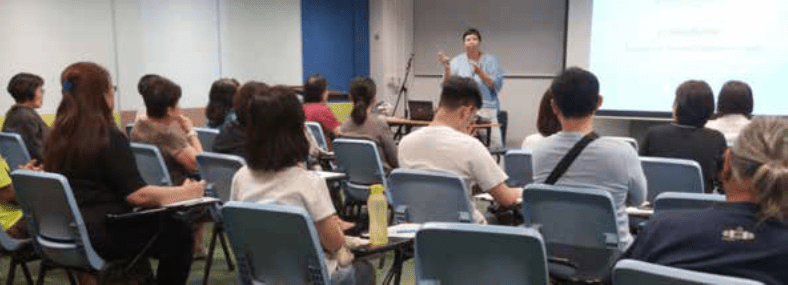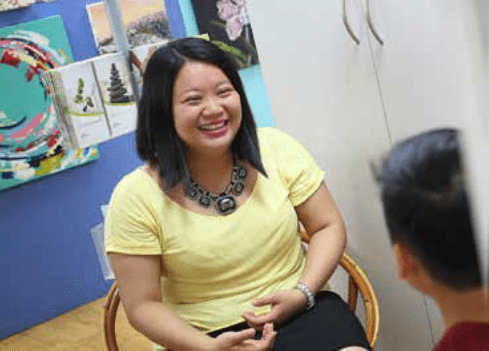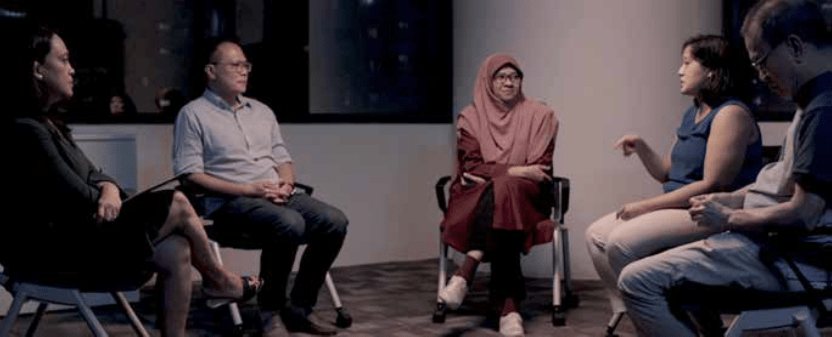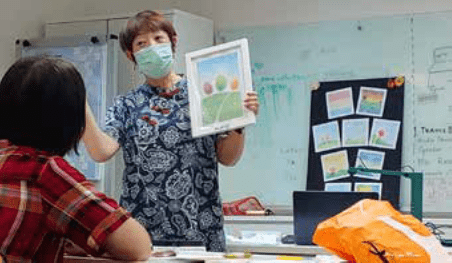Stories > Championing Caregivers
Championing Caregivers
Non-profit organisation Caregivers Alliance Limited helps mental health caregivers find solidarity among their peers by providing the resources and emotional support.
BY RACHEL AJ LEE
ore often than not, society is oblivious to the plight of individuals suffering from mental health conditions, which are not evidently visible.
Even more imperceptible is the relentless strain on their caregivers whose commitment typically lasts a lifetime.
“The problem is that caregivers are not visible. They are not seen as vulnerable, when in fact they are,” Tim Lee, executive director of Caregivers Alliance Limited (CAL), shares. “Mental illness is often not obvious the way a physical illness or disability is. And then there is the added issue of stigma. And because they are unwilling to talk about it, people around them can often fail to see how challenging the life of a caregiver can be.”
Take, for instance, Michelle*, the sole caregiver to her husband who suffers from schizophrenia, to her daughter with special needs, and to her mother with signs of early dementia.

The Caregiver to Caregiver (C2C) programme by Caregivers Alliance Limited (CAL) provides caregivers a better insight to individuals with mental health issues, so that the caregivers are better equipped to shoulder their responsibilities.
Trying to balance her job in essential services and household matters, from doctors’ appointments to ensuring the kitchen is stocked, takes a toll. On some days, the sheer number of responsibilities feels overwhelming, she says.
Meanwhile, Nisha*, a caregiver for an older sibling who suffers from schizophrenia, says: “Many caregivers suffer in silence because of the shame and stigma attached to mental health. There are more stories and resources in newspapers and health publications nowadays, which have allowed the conversation on mental health to be more open in Singapore – compared to 20 years ago when my sister was first diagnosed. But there is still much ambiguity about the causes of mental health.”
LEARNING TO COPE BETTER
This is the very reason CAL exists – to assure mental illness caregivers that they are not alone, help them build rapport with their peers, and impart skills to cope with overwhelming situations. Most importantly, it helps them understand they need to be at peace with caregiving to perform the role with utmost love and patience.
CAL offers a fully funded 12-week Caregiver to Caregiver (C2C) programme to individuals hoping to gain a deeper insight into the various types of mental health issues, and better understand the people under their care.

CAL also offers caregivers the opportunity to connect with fellow caregivers through several peer support groups that allow them to discuss their experiences and express solidarity with each other.
“We teach them practical skills on caregiving. We also help them to shift their mindset because, for many people, prolonged caregiving can be tiring. It can also lead them to become more impatient. We re-orient them back to the reasons why they are caregiving in the first place: They are doing so out of love,” Lee shares.
The programme also teaches caregivers how not to be afraid to ask for help, whether from the police or Institute of Mental Health (IMH), as some of their charges can be violent and physically abusive. The course also highlights the importance of empathy, and teaches problem-solving during a crisis.
“In the beginning, it was emotionally tough and mentally challenging. I was running out of ideas and ways on how to manage caregiving,” recounts Janet*, a stay-at-home mother, whose son, Calvin*, has Asperger’s or high-functioning autism. “But after attending C2C and hearing others share their stories, I felt like I had gained a better grip on things and the knowledge to handle the situation better.”
“THE PROBLEM IS THAT CAREGIVERS ARE NOT VISIBLE. THEY ARE NOT SEEN AS VULNERABLE, WHEN IN FACT THEY ARE. MENTAL ILLNESS IS OFTEN NOT OBVIOUS THE WAY A PHYSICAL ILLNESS OR DISABILITY IS,” SAYS TIM LEE, EXECUTIVE DIRECTOR, CAREGIVERS ALLIANCE LIMITED.
While he is generally independent, there are days when Calvin needs extra care and support should there be something that triggers him, such as an interruption in the Wi-Fi connection. Another skill Janet picked up was how to remain calm during a brewing situation and to defuse it when dealing with her son.
Reflecting a more integrated approach, caregivers are referred to CAL through hospitals such as IMH, Ng Teng Fong General Hospital and National University Hospital, with which Lee says they have “close partnerships” with. Some 6,000 people have completed the C2C course since the non-profit was founded in 2011.
But what happens subsequently?
“That’s the beauty of our programme. Aside from imparting skills, we also hope to establish a peer network. These caregivers come together as a class over 12 weeks, and they bond over their experiences,” he points out.
Indeed, the support network is one of the most fruitful outcomes of the programme. “After the course, my peers and I formed a support group where we share about our problems, learn from each other, and walk the journey together. Encouragement from other caregivers gives me strength,” Michelle shares.
Janet agrees: “Regardless of which [CAL-related] chat group I’m in, I find that everyone has been really supportive. We will always share and update each other on health issues or new medical findings.”
The CAL course and resources make the daunting task of full-time caregiving more manageable. “Fundamentally, I’ve realised I am not alone anymore. Platforms like CAL allow us to discuss our most challenging experiences openly. We laugh, cry, and share our candid emotions and frustrations without anyone judging us,” remarks Nisha.

CAL launched the Caregivers for Caregivers Support Network to help individual caregivers find relevant support groups.
“YOU CANNOT POUR FROM AN EMPTY CUP. BECAUSE OF CAL, I AM AWARE THAT I NEED TO TAKE TIME OFF TO CARE FOR MY OWN EMOTIONAL AND MENTAL NEEDS, AND ENSURE I AM PHYSICALLY HEALTHY TO TAKE CARE OF MY SON,” SAYS JANET, A CAREGIVER.
At this point, there are about 200 active CAL support groups. In 2019, the organisation also created a new service called Caregivers For Caregivers Support Network, with the aim of helping caregivers – who have drifted apart from their initial support group – find another suitable group.
SELF-CARE IS IMPORTANT TOO
For caregivers, it is a full-time job that is both emotionally and physically challenging. And trying to be stronger than they actually are can be an exhausting experience. Most of the time, they are so engrossed in caregiving that they can fail to take care of themselves, with some even feeling guilty about taking time off. That is why self-care – an important component of the C2C course – is reiterated time and again.
For Michelle, this involves heading out for walks, chatting with friends and listening to health programmes or videos. “We need to rest in order to not over-tire our minds and bodies, and to be able to continue the long journey ahead,” she says.
Aside from having a strong social network, Nisha constantly reminds herself of the simple pleasures in life such as taking time to enjoy a cup of coffee, or lighting her favourite scented candle when she needs to take a breather.
She adds: “It helps that I have another sibling at home to help me care for our elder sister, and I can go out with a peace of mind. There are others that struggle because they are the sole caregivers, but it is important that they know about the respite courses, such as yoga and art classes, available to them through CAL.”
Self-care helps to strengthen the caregivers’ psychological fortitude. “You cannot pour from an empty cup. Because of CAL, I am aware that I need to take time off to care for my own emotional and mental needs, and ensure that I am physically healthy to take care of my son,” says Janet.
THE ROAD THAT LIES AHEAD
But the C2C programme is just the beginning in a series of initiatives aimed at helping the caregivers of individuals with mental health conditions. In 2018, an eight-week programme for caregivers dealing with dementia was developed. This is because unlike other mental illnesses that have a chance at recovery, dementia has none, which makes the caregiving journey different and more challenging.
“Empathetic and mindful discussions on mental health issues surrounding loved ones are vital in erasing the associated stigma and creating a healthier collective for the caregivers.”
Nisha, a caregiver and C2C course participant
CAL then launched an eight-week programme last year, directed at young caregivers aged 35 and below. According to Lee: “These individuals are eager to learn, as a lot of them are secondary caregivers for their friends, siblings, parents or grandparents. And because they are younger, the way they learn is different.”

One of the most important components of the C2C programme is the self-care module that highlights the importance of caregivers’ physical and mental wellbeing in order for them to carry out their caregiving tasks.
In the longer term, Lee also wants to customise programmes for different illnesses such as schizophrenia, bipolar disorder, depression and eating disorders, as well as a caregiver-to-be programme.
It is the latter on which he makes an interesting social observation: “This programme aims to spread awareness that you cannot outsource caregiving to your single sister – most caregivers are unmarried ladies – or someone who is well-meaning and steps up to the job,” he notes. “We really want to drive home the point to please support your loved one.”
As an encouraging sign, when the story was published on Our Better World (OBW), Singapore International Foundation’s digital storytelling platform, it sparked deeper conversations on mental health as well as caregivers’ individual experiences on the subject. It was viewed close to 600,000 times on OBW. Multiple inquiries to CAL, coupled with numerous shares and comments on social media, further contributed to raising awareness of the non-governmental organisation’s work.
When asked how such extensive support and call-to-action programmes could be handled by his relatively small 34-man headcount, Lee says sanguinely: “I want to scale, but I’m constrained by the amount of resources and how much we as a team can do. We’ve been able to help only 6,000 people in the last eight years, but there are so many more out there.
“I hope to secure more funding so we can expand and do more, because with the ongoing Covid-19 pandemic, obtaining funds hasn’t been easy. Furthermore, Covid-19 has exacerbated the number and types of mental illnesses.”
Some instances of such illnesses brought about by the pandemic, he elaborates, are a breadwinner who lost his job and fell into depression with suicidal thoughts, and a young person who was studying overseas and has now been called back home due to university closures, not knowing when she will be able to go back. Future uncertainty seems to be a recurring reason in such cases. Any amount of extra support in caregiving can often feel inadequate due to the strenuous nature of the task.
On what more can be done by society, Nisha observes: “Empathetic and mindful discussions on mental health issues surrounding loved ones are vital in erasing the associated stigma and creating a healthier collective for the caregivers.”

Scan the QR code or visit
www.ourbetterworld.org/series/mental-health
/stories/caregiversupport to find out more.
